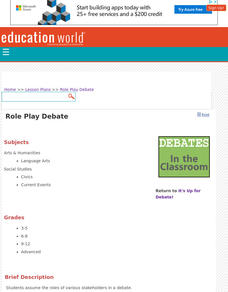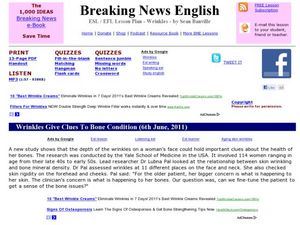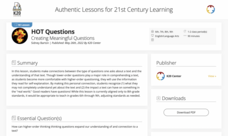Curated OER
Sustainable Livestock
Students investigate healthy eating habits by researching livestock. In this food sustainability instructional activity, students research the negative impact factory farming has on our environment due to pollution. Students define...
Curated OER
Pesticide Watch Card
Students examine human health by identifying dangerous pesticides. In this agriculture lesson, students research the food production system in the United States and discuss dangers such as pesticides, chemicals and insecticides which...
Curated OER
Strong Descriptive Writing: James and the Giant Peach
Support your writers! Clear procedures and appropriate support make this a superb resource for elementary writing instruction. Ready your class to compose original descriptive paragraphs inspired by the episode in Roald Dahl's James and...
Curated OER
It's Your Opinion
Everyone has a different opinion about the characters they read about in books. Have your class explore forming an opinion and finding evidence to support it as they read and discuss what they think about a particular character. They...
Curated OER
Role Play Debate
Suggested topics for a role play debate include school uniforms and culpability for drunk driving, but any issue of interest to your class will work. What are the hot issues in your community or on the news right now? Class members...
Curated OER
Wrinkles ESL Lesson
Practice English vocabulary and dialogue. An ELD class completes a true/false worksheet about aging and wrinkles, then read an article entitled "Wrinkles Give Clues to Bone Condition" using context clues to determine vocabulary...
Curated OER
ASL: Building a functional vocabulary
Best resource ever! Teaching and learning to teach ASL just got easier. For special education teachers or those working with hearing impaired students, this lesson provides story and time telling practice using ASL. Each blue link you...
Curated OER
The First (and Last) Words
What does "freedom of speech" mean to your class, especially in the context of Internet communications? In round-table discussion format, middle and high schoolers address the issues discussed in "State Legislatures Across U.S. Plan to...
Curated OER
Non-Verbal Communication
Many developmentally disabled young scholars struggle with accurately conveying messages and interpreting those of others around them, especially when they are non-verbal. This lesson contains fun activities and exercises, such as...
Curated OER
Martin Luther King Jr. and Nonviolence
Using the book, Martin's Big Words, learners will discover the life of Dr. Martin Luther King Jr. Vocabulary is identified throughout the story by using several his famous protest speeches as examples. Class discussions on racism, during...
Curated OER
A Historical and Educational Perspective on American Sign Language
Using Sign Language to Communicate with Your Special-Needs Students in the Classroom
K20 LEARN
HOT Questions: Creating Meaningful Questions
Scholars examine a list of questions and sort them into corresponding groups based on similarities. A gallery walk allows peers to see how their peers sorted questions and leave notes. Costa's Level of Questions is the topic of a...
Overcoming Obstacles
Giving Presentations
With their action plans in place, groups now develop a presentation to get others interested in their project. Scholars learn how to present themselves during a presentation and elaborate on and add visuals to their presentation. After...
Overcoming Obstacles
Writing Reports
Following a review of how to research and take notes, scholars define the term paraphrase and identify ways to organize information and finish reports. To put their newfound knowledge to the test, learners interview a peer, take notes,...
Overcoming Obstacles
Using Appropriate Resources
A lesson dives deep into reference materials. The class begins with a discussion of which resources are best used for specific purposes and how to identify ways to get the needed information. Learners share information about the internet...
Overcoming Obstacles
Identifying Options
Making a decision can be more like a multiple-choice question than a yes/no one. Through a series of activities, middle schoolers learn how to consider and identify options, choices, and alternatives when faced with an important decision.
Overcoming Obstacles
Gathering Information
Before making important decisions, gathering as much information as possible is best. That's the take-away from the second lesson in the Decision-Making module of the Overcoming Obstacles course. Middle schoolers engage in a series of...
Overcoming Obstacles
Expressing Opinions Constructively
Everyone has opinions. The trick is to learn how to disagree in a way that doesn't cause problems. The activities in the final instructional activity in the Communication Module focuses on learning how to express opinions constructively....
Academy of American Poets
The African American Experience
Disrespect can be as subtle as a frown or a turn of a head. To prepare for a study of Toi Derricote's poem "The Weakness" class members create wordless skits that demonstrate subtle or not so subtle signs of disrespect. After a...
Franklin D. Roosevelt Presidential Library & Museum
What Does It Mean to be a Good Citizen?
Civics scholars are challenged to determine what it means to be a good citizen. Class members select three adults in their lives and interview them to discover what the term "good citizen" means to each of these people. The class then...
Franklin D. Roosevelt Presidential Library & Museum
Pearl Harbor Activity #4: Who is the Audience?
Young historians use the prompts on a worksheet to analyze President Roosevelt's "Day of Infamy" speech. They identify the intended audience for the speech, the devices FDR used to persuade his audience, the responses promoted, and the...
Franklin D. Roosevelt Presidential Library & Museum
Pearl Harbor Activity #2: Why Do Words Matter?
Words matter! That's the big idea behind an activity that asks scholars to replace words in FDR's "Day of Infamy" speech with synonyms. They then listen to a recording of President Roosevelt's address and compare his version to their own.
Newseum
Covering a Catastrophe: Press Conference Simulation
Young journalists have an opportunity to experience the challenges of covering a catastrophe by staging a mock press conference. Half the class acts as reporters while the others act as officials from the mayor's office.
British Council
World Book Day
Scholars discover information about World Book Day. Working in pairs, learners read a text about the special day, and then write about their own favorite book. To finish, pupils complete worksheets and a crossword puzzle about World Book...

























